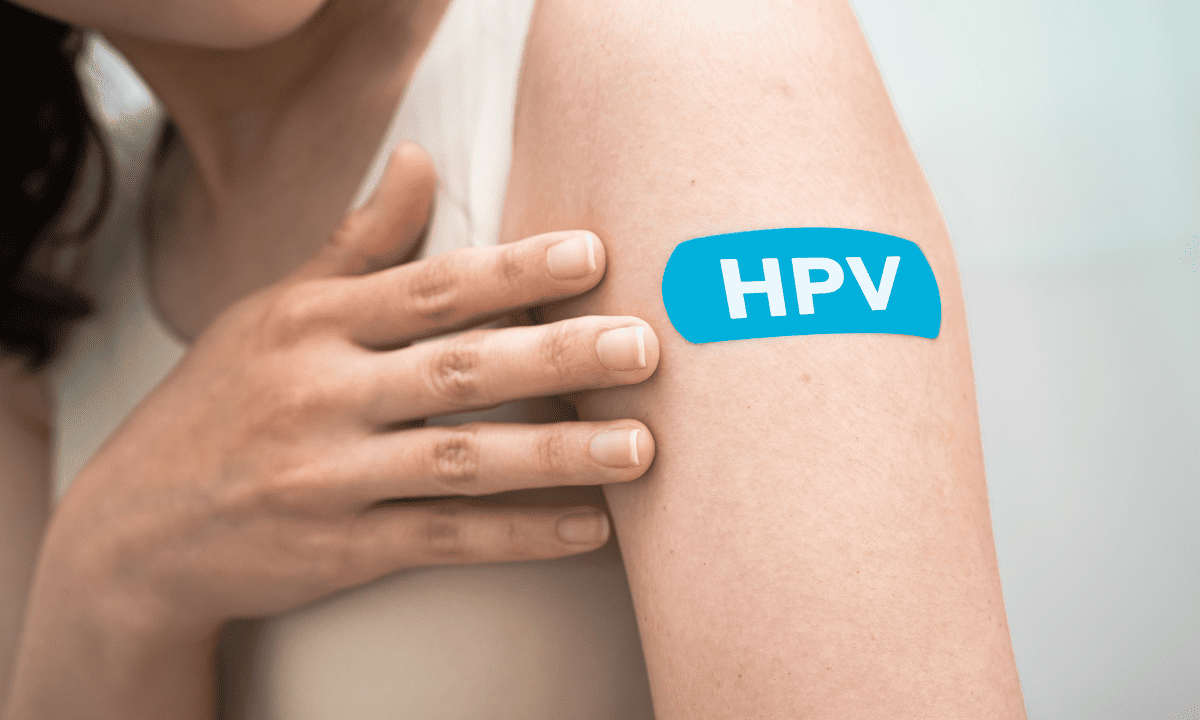The moment you learnt cervical cancer is linked to a sexually transmitted virus, the worry probably hit you: does that mean the cancer itself can spread through sex? Maybe you're concerned about protecting a partner, or you're anxious about your own risk after being intimate with someone who's been diagnosed.
This fear is common, but the reality is far more complex than it appears. How does a virus that spreads through sex turn into cancer? Can cancer cells themselves be transmitted? What's the actual risk to you or your partners? These questions are also common, and knowing the difference between HPV and cervical cancer can help you feel more informed and reassured.
What is cervical cancer?
Cervical cancer is a condition that affects the cells of the cervix, the lower part of your uterus that connects to your vagina. It usually develops slowly over several years, often beginning with changes in cervical cells that do not cause any symptoms.
Persistent infection with high-risk types of human papillomavirus, or HPV, is the main cause of cervical cancer. Not all types of HPV are harmful, but strains 16 and 18 are responsible for the majority of cases.
Although hearing the word “cancer” can feel overwhelming, it is important to know that cervical cancer is one of the most preventable and treatable forms of cancer when detected early.
Can cervical cancer be transmitted through sex?

Cervical cancer cannot be passed from one person to another during sexual activity because cancer itself is not contagious.
What is transmitted through sex is human papillomavirus (HPV), a very common sexually transmitted infection. HPV is the primary cause of cervical cancer, but having HPV does not mean a person will definitely develop cervical cancer.
Most HPV infections clear on their own without causing any problems. Persistent infection with high-risk HPV types, however, can lead to cervical cell changes and potentially cancer over time.
Cervical cancer vs HPV: what is the difference?
Because HPV is closely linked to cervical cancer, it’s easy to see why many people confuse the two. While they are connected, they are not the same thing. Here’s a closer look at HPV and how it differs from cervical cancer.
What is HPV?
HPV is a very common sexually transmitted infection (STI) that affects the skin and mucous membranes. There are more than 100 types of HPV. Most are harmless and cause no symptoms. Low-risk types may cause genital warts, while high-risk types can lead to cell changes that increase the risk of cancer.
However, most HPV infections clear naturally within one to two years. The immune system usually takes care of them without any medical treatment at all.
Difference between HPV and cervical cancer
HPV is a viral infection that is usually temporary, mild, and symptom-free. On the other hand, cervical cancer is a disease that may develop many years after a persistent infection with a high-risk HPV strain.
You can have HPV without developing cervical cancer. You can also develop cervical cancer only after long-term, untreated HPV infection. The distinction matters, because while HPV is common, cervical cancer remains relatively rare.
How can HPV lead to cervical cancer?

Most HPV infections do not cause serious health problems, and in many cases, the virus is cleared naturally by the immune system. However, when certain high-risk types of HPV persist, they can gradually affect the cells of the cervix.
This process usually happens slowly, over many years, giving plenty of time for detection and treatment. It usually follows several stages:
HPV enters and infects the cervical cells.
In most women, the immune system clears the virus naturally.
In some cases, high-risk HPV remains in the body for many years.
Persistent infection can cause abnormal cell changes.
If untreated, these abnormal cells may progress to precancerous lesions.
Over 10 to 15 years, these lesions can gradually become cervical cancer.
This long timeline is one of the reasons regular screening is so effective. There is plenty of time to detect and treat changes before cancer develops.
Preventing HPV infection and cervical cancer
Although HPV is common, there are several reliable ways to reduce your risk of infection and prevent cervical cancer.
Safe sexual intercourse
Using condoms or dental dams during sexual activity can reduce the risk of HPV transmission, though they do not provide complete protection because HPV can spread through skin contact. Limiting the number of sexual partners can also reduce your exposure to high-risk HPV strains.
HPV vaccination
The HPV vaccine is one of the most effective tools to prevent cervical cancer. It protects against the most dangerous types of HPV, including types 16 and 18. Vaccination is recommended for preteens, but people up to age 45 can still receive it. Even if you are older or already sexually active, the vaccine can still provide protection.
Regular screening
Vaccination is important, but regular cervical screening is also essential. Screening allows your doctor to detect abnormal cell changes before they develop into cancer, making treatment easier and more effective.
Pap test:
Detects abnormal changes in cervical cells.
HPV test:
Identifies high-risk HPV types that may lead to cancer.
To keep track of your cervical health, schedule an appointment with Thomson Medical today. Early detection through regular screening can make a significant difference in prevention and treatment.
Our women's cancer specialist
Loading...
Sex and intimacy after a cervical cancer diagnosis

A diagnosis of cervical cancer can affect both physical comfort and emotional well-being. It is normal to feel anxious or uncertain about sexual activity during and after treatment.
Treatments such as surgery, radiation, and chemotherapy may cause:
Vaginal dryness
Pain during sex
Narrowing or scarring of vaginal tissues
Reduced desire or emotional stress
If you experience these changes, there are steps that can help you recover and maintain intimacy:
Talk to your partner:
Open and gentle communication can reduce anxiety and maintain emotional closeness.
Use aids for comfort:
Water-based lubricants, moisturisers, or vaginal dilators (if recommended by your doctor) can ease discomfort.
Follow your doctor’s guidance:
Always check with your healthcare provider before resuming sexual activity.
Every recovery journey is unique, and taking these steps can help restore comfort, confidence, and intimacy over time.
Early signs and key symptoms of HPV infection
It’s natural to feel concerned about HPV, especially since the infection often shows no obvious signs. Many people only find out they have HPV through routine cervical screening. In some cases, there may be subtle signs to watch for:
Genital warts:
Caused by low-risk types of HPV
Abnormal Pap test results:
May indicate that high-risk HPV has affected cervical cells
High-risk HPV usually does not cause symptoms until changes in the cervical cells become more serious. This is why regular screening is so important: it can detect issues early, before they develop into more serious problems.
You should speak with a doctor if you notice:
Unusual vaginal bleeding
Ongoing pelvic pain
Changes in vaginal discharge
Discomfort during sex
Abnormal cervical screening results
These symptoms do not always point to cancer, but they should always be checked to give you peace of mind.
If you notice any of these symptoms or have concerns about your cervical health, schedule an appointment with Thomson Medical to speak with a doctor. Early evaluation can help identify the cause and ensure you get the right care.
FAQ
Can men get HPV from women with cervical cancer?
Yes, men can acquire HPV from sexual contact with an infected partner. High-risk HPV can cause penile, anal, and throat cancers in men. Cervical cancer itself cannot be transmitted.
Is cervical cancer curable?
Yes, cervical cancer is highly treatable, especially when detected early. Key treatment options and considerations include:
Surgery:
Procedures such as a hysterectomy or removal of abnormal cervical cells can often cure early-stage cervical cancer.
Radiation therapy:
Targets and destroys cancer cells; sometimes used alongside surgery.
Chemotherapy:
Can be used alone or combined with radiation to treat cancer that has spread.
Advanced-stage care:
Even for more advanced cervical cancer, specialist management can control the disease, improve quality of life, and increase survival rates.
Can I have sex during or after cervical cancer treatment?
During cervical cancer treatment, doctors often recommend avoiding sexual intercourse, especially during radiation or chemotherapy.
After treatment, you can usually return to sexual activity once your doctor confirms it is safe. You may need time to adjust physically and emotionally. Lubricants, moisturisers, and open communication can be helpful.
How long does HPV take to cause cervical cancer?
In most cases, it takes 10 to 15 years for persistent HPV infection to cause cervical cancer. This long timeframe emphasises the importance of regular screening.
How often should I get cervical cancer screenings?
Keeping up with cervical screening is one of the most effective ways to protect your health and catch any changes early, often before they cause problems. Here’s the recommended schedule based on age:
Women aged 21 to 29:
Pap test every 3 years.
Women aged 30 to 65:
Pap test plus HPV test every 5 years, or Pap test alone every 3 years.
After 65:
Screening may stop if recent past results were normal and there’s no history of abnormal findings.
Can the HPV vaccine prevent all types of cervical cancer?
While the HPV vaccine offers strong protection, it doesn’t prevent every type of cervical cancer. The vaccine covers the HPV strains most commonly responsible for cervical cancer, significantly lowering your overall risk. However, there are other less common high-risk HPV types that the vaccine doesn’t target.
Can I get HPV or cervical cancer without having sex?
Yes, it’s possible but extremely unlikely. HPV is primarily transmitted through sexual contact, including vaginal, oral, and anal sex, as well as close skin-to-skin genital contact.
Non-sexual transmission can occur, but it’s very rare. In unusual cases, HPV can be passed from mother to baby during childbirth or through close intimate skin contact that isn’t sexual.
Even though the risk outside of sexual activity is very low, vaccination and regular cervical screening remain the most effective ways to protect yourself.
Can I live a normal life with HPV?
Absolutely. Most HPV infections resolve naturally. With proper monitoring, reassurance, and regular check-ups, most women with HPV live completely healthy lives without ever developing cervical cancer.
The information provided is intended for general guidance only and should not be considered medical advice. For personalised recommendations and tailored advice, schedule an appointment at Thomson Women's Clinic & Cancer Surgery.
For more information, contact us:
Thomson Specialists (Women's Health)
Thomson Women's Clinic (TWC)
- Novena:
6592 6686 (Call), 8611 8986 (WA) - Bukit Batok:
6569 0668 (Call), 8686 3525 (WA) - Choa Chu Kang:
6893 1227 (Call), 8282 1796 (WA) Jurong:
6262 8588 (Call), 6262 8588 (WA)- Katong (female doctor):
6970 2272 (Call), 8611 9020 (WA) - Punggol:
6243 6843 (Call), 8811 0328 (WA) - Sembawang: 6753 5228
- Sengkang: 6388 8125
- Serangoon (female doctor): 6382 3313
- Tampines: 6857 6266
- Tiong Bahru: 6276 1525
